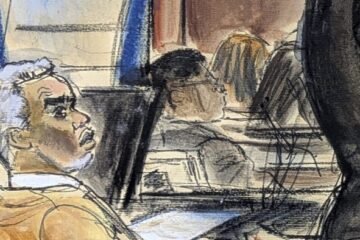Note: This article contains spoilers for the film Sinners.
The defining scene of Ryan Coogler’s directorial career so far comes about halfway through Sinners in a scene that ties every generation of Black folks and our music in a time-warped, cross-cultural music sequence that takes place in one take. The scene, in which Sammie’s musical performance unites the diaspora across time and space, becomes the movie’s turning point and crystallizes a central theme: love your Blackness and the home it came from, because there will always be someone coming to take your magic. At that moment, Sinners takes on a deeper meaning and one that affirms and hugs us by the time the end credits roll.
Sinners, set in Jim Crow-era post-WWI Mississippi Delta, is a horror vampire flick about a set of twins, Smoke and Stack (both played by Michael B. Jordan), who return home from years traveling to war, Chicago, and other unspoken parts of the world, to open up a juke joint. They cobble together friends, lovers and family to get the place up and running for a big night. Their younger cousin Sammie (played by Miles Caton, making his unforgettable debut) is the musician they need to make it all work. But his music draws the attention of a trio of vampires who want his soul.
It’s that soul that makes Sinners so beautiful.
As the twins travel through Clarksdale gathering their community, they reclaim their love of a home they want to return to. With each friend they find—Cornbread, Delta Slim—the twins become more whole. But it’s not just the twins becoming one with home through the journey. They’re also filling the audience with a sense of connection and belonging to their Mississippi ancestry.
As a Black boy from Jackson, Mississippi, a couple of hours from Clarksdale, I found every scene to be like a siren call to the place that made me. Each shot – the cotton fields that reminded me of drives to the Delta to hear my father speak, the brightest sunrises that give way to the darkest star-filled nights, the way each character felt the music in their bones – beckoned me to the place that made me. When Sammie carried that sack of cotton at the beginning of the movie, I beamed because I remembered that my sharecropping grandfather, whom I never met, was said to have been able to pick three hundred pounds of cotton a day, and the pride I feel every time I’m reminded of that feat.
I, without hyperbole, moved to the edge of my seat and pointed at the screen when the Chinese storeowners, the Chow family, appeared early, because that, too, felt like home. I became enamored with the connection between Chinese and Mississippi culture years ago while researching for my book, The Movement Made Us, about my father, the Civil Rights Movement and Mississippi. I was fascinated by the story of C.O. Chinn, a Black freedom fighter with Chinese heritage. I learned about the Chinese folks who settled in the Delta during Reconstruction and worked on plantations before opening grocery stores that served Black folks who couldn’t shop in white establishments. Chinn was from right outside of Jackson in a city called Canton, where the locals assured me that the city’s name has Chinese origins, even if historical documents can’t verify it. So yes, the Chows, their Southern accents, and their blended culture felt like home, too.
Then there were the women. The deeply Southern, wise, churchy women like Pearline (Jayme Lawson) who loved their sensuality as much as they loved their gentility. Or Mary (Hailee Steinfeld), whose bloodline is as complicated and compromised by the bigotry that made her keep her heritage a secret. But she was still family, allowing her to be embraced by the Black folks she grew up with. And then there’s Annie, the physical embodiment of home. She represents an ancestral home to West Africa and traditional diasporic religions. She’s a conduit to the afterlife for Smoke and the recently converted vampires who wanted her to join them. And she’s home for Smoke, whose body never forgot her, even when he was in Chicago, the Mississippi of the North.
Annie (Wunmi Mosaku) is also a new home for movies like Sinners, as we just do not see full-figured, dark-skinned Black women as love interests in blockbuster movies, especially in movies where an action superstar like Michael B. Jordan is fully enraptured by her emotionally and physically. And yes, men loving, desiring, and seeking to sexually please Black women feels like a specific type of home, too.
Overall, Coogler spends the first half of the movie establishing the home and the soul therein. Traditionally, we would call this world-building. But this is different. It’s world-remembering, showing us the parts of our Blackness found in Mississippi and bringing back familiarities we didn’t know we’d forgotten.
And as soon as we remember to love our Black home, we get a knock on the door threatening to take it all away.

Which goes back to that musical number. When Sammie starts singing in that juke joint, he conjures up spirits from the past – West African drummers, whose dancing and drumbeats created the foundation for those blues. But he also conjures ghosts of the future – a turntable and DJ appear on stage; a ballet dancer traipses through the club; west coast dudes with rags under their fitteds emerge. The history of Black art collapses into a long, one-shot scene that brought me to the verge of tears.
The musical number ends with the juke joint metaphorically in flames; a structure unable to contain the multitudes of our infinite genius. But the music also beckons Remmick, a vampire of Irish descent who has outlived his homeland peers and wants Sammie’s musical gifts to reach them in the same way Sammie called upon his own ancestors during his performance.
The face-value metaphor is clear: this is about colonization and cultural appropriation. The bloodsuckers can’t take what’s yours unless you invite them in. The terror of their infiltration is always right outside. They will swear they want “equality” but only want to steal our hearts, erase it, and force assimilation. There’s a reason, after all, that Black folks recently converted to vampires are suddenly in on the Irish singing and dancing outside of the juke joint. There’s a musical conversation to be had, for sure, about who gets to define genre, who takes, and who gives. If Kendrick Lamar’s “Not Like Us” is an abstract, then Sinners is the whole thesis on what happens when we are drained of the bloody love we pour into our art – and the importance of keeping the bite marks away from our flesh.
But there’s something more dangerous afoot here in the presence of demons. The vampires don’t just want our music or our culture. They want our homes. They want to so completely eradicate us from existence that we have nothing; even the memories of our souls will get extinguished. But Coogler again reminds us that our culture travels with us. You can burn down a juke joint or try to destroy every single person who remembers what happened on a night in the Mississippi Delta where cries rang out to the clear sky. But it won’t work.
That’s why so much of the movie’s beauty occurred in another structure: the cars. In these modes of transportation, Stack first hears his cousin sing, and we see an everlasting joy come across his face – a moment that returns at the end of the movie. It’s in that car where Stack created his own legends that traveled, including a fictional origin story behind Sammie’s guitar. It’s in this car that Delta Slim turns his origin story into blues music. And it’s in this car where Sammie takes his guitar and finds freedom elsewhere.
No one actually leaves Mississippi, though. As James Baldwin once wrote: “Perhaps home is not a place but simply an irrevocable condition.” Sammie didn’t take his guitar and leave Mississippi. He got in his car and brought Mississippi with him. That’s the often-unspoken part of the Great Migration; Black folks didn’t leave Mississippi behind to find lives in other parts of the country. They brought Mississippi with them to the rest of the country, which is why when I lived in Chicago, I met dozens of people who had kinfolk near my hometown. It’s how you can trace this country’s music to those same plantations in the Delta.
And it’s how a director born and raised in Oakland, a city that became a hub for Black folks during the Second Great Migration thanks to the Southern Pacific Railroad “Sunset Route” that originated in Louisiana, can reach back to that family history and create something that sought to reclaim our history and reimagine our future.
This is the story of Sinners, where home flows so purely through our veins that not even the teeth of a vampire can extract it, no matter how hard they try.











